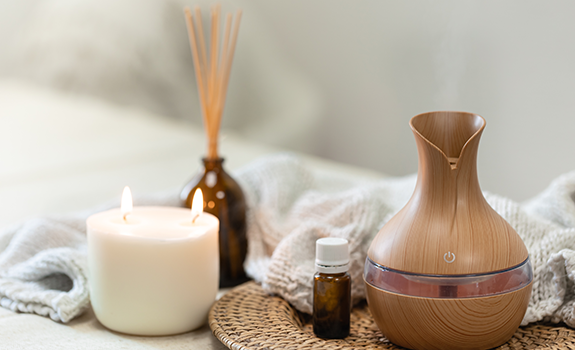September 13, 2023
Sweet Smell of Cognitive Success

By Ram Rao, Ph.D., Principal Research Scientist for Apollo Health
When aromatic fragrance drifted through the bedrooms of older adults for two hours every night, their memories improved. Subjects in this “scent study” displayed a 226% increase in cognitive capacity compared to the control group. The research findings confirmed the long-known nexus between smell and memory. It also turned a simple, non-invasive, aromatic technique into a powerful tool for strengthening memory and potentially preventing dementia.
Olfaction (the sense of smell) is one of the oldest senses and is closely linked to brain areas that deal with emotion and memory. This is the reason why certain aromas elicit past memories and specific experiences even from very long ago. The sense of smell or fragrance and its effect on brain function is often neglected, but the right kind of aroma could help the brain to keep it resilient as you grow old. Scientists have long known that the loss of olfaction (the ability to smell) is associated with the development of Alzheimer’s (AD) and other dementias, Parkinson’s disease (PD), and schizophrenia. It is also well understood that deficits in olfaction occur even before clinical symptoms of AD or PD are fully developed. Losing the sense of smell correlates with a loss in the brain’s memory circuits, hinting at a strong connection between smell and brain function. Thus, the question uppermost in the minds of neuro-researchers is whether restoring the capacity to smell will reverse some of these associated brain conditions.
One of the methods to provoke the sense response involves enriching the environment with aromatic odors. Studies in animal models of neurodegenerative diseases showed that exposure to certain aromatic fragrances improves smell sensitivity and stimulates the neuroplastic response. Similarly, encouraging results from a few research studies suggest that olfactory exposure to aromatic scents might be a potentially effective non-pharmacological intervention for people with dementia. These studies showed that in addition to improving their olfactory capacities, the aromatic scents also boosted the subject’s memories and language skills and eased depression.
But one need not have to wait to lose memory to experience the benefits of these fragrant oil mists. In a recent study involving 43 men and women aged 60 to 85 without memory impairment, researchers showed that cognitive performance can be boosted by simply diffusing several different perfumes through the bedroom. In the study, all the participants were given a diffuser and seven cartridges containing fragrances of rose, orange, eucalyptus, lemon, peppermint, rosemary, and lavender. While subjects in the enriched group received full-strength cartridges, the participants in the control group were given the aromatic oils in very tiny amounts. All of the participants used one of the fragrant oils with a diffuser to spread the aroma in their bedroom for two hours every night over six months, rotating through their menu of aromatic oils. A battery of neuropsychological tests was then used to compare the subject’s memory, verbal learning, planning, and attention-switching skills before and after the six-month trial.
To the researcher’s surprise, people in the experimental/enriched group showed a 226% increase in cognitive performance compared to the control group. Brain scans also revealed a significant change in the anatomical areas of the brain involved in memory and thinking within the enriched group. The imaging scans revealed better integrity in the brain pathway called the left uncinate fasciculus, which connects the medial temporal lobe to the decision-making prefrontal cortex. These areas tend to be less robust with age. The enriched group also reported undisturbed good quality sleep. The study results are remarkable as all of the subjects were of similar sound mental health.
While the results of the study seem exciting, there are several unanswered questions.
1. In addition to benefits to the structure and function of the brain, did exposure to aromatic oils improve or exacerbate smell sensitivity, especially in the experimental group?
2. Even though both groups had predominantly more females than males, the results were pooled for the final analysis. Was there a gender difference in brain structure and function among the two groups?
3. There were 15 females and five males in the experimental group. Did all 20 show improvements, or was it just a subset of individuals that showed significant improvement?
4. For how long were these subjects followed, and were the improvements sustained?
As remarkable as the study results may be, one of the biggest misconceptions about essential oils is that they’re safe to use because they’re natural. While essential oils may offer various health perks, misusing them can be harmful. Some essential oils are made with synthetic ingredients instead of actual plant material. While they may smell like the plant, they may lack the plant compounds responsible for a specific health effect. It is always a good idea to consult a doctor or a certified aromatherapist about which essential oils are safe to use, how to use them, and the proper dosage. Keeping the brain areas stimulated as we age is vital to maintaining good cognitive health, and one of the pathways to good brain health seems to run through the nose.




